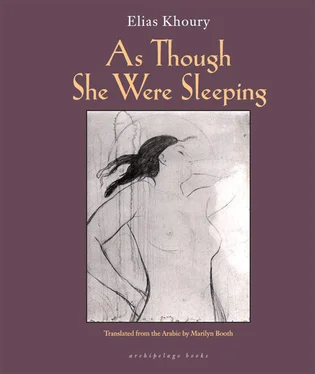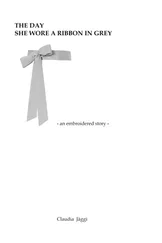You mean, when I have my son you will die?
Not me alone.
No, I don’t want my son to die, she cried. Does it make any sense for this to happen? Does it make any sense for a father to kill his own son?
The monk opened the book and began to read.
Ibrahim bound his son in ropes and set him before the pile of kindling. He sat waiting when lo and behold, the sky shone with a light, and Ibrahim saw three angels bearing a white ram that gave off the fragrance of water. They placed him on the pile of wood.
The prophet knelt and his tears ran. He came to his son, untied his fetters, and gently pushed him aside. Ishaq stood and went to the white ram. He put his hand on the animal’s head and heard a low moan coming from the belly of the small trembling animal. He ran to cut an armful of green grass to feed the ram. The animal nosed the grass and Ishaq’s tears welled. His hands filled with tears. He turned back and saw his father coming, a knife in his hand.
No, Father! shrieked the boy.
Ibrahim shoved his son away, seized the ram by the neck, and slaughtered him with a cry of praise and joy to his Lord. The blood spurted out to fill the wadi, and the boy heard the sound of rushing blood. The sound rang full in his ears. The blood flowed before him in a current that twisted and turned, seeking a channel in the earth, and the screams rose.
When Ibrahim slaughtered the ram, and the man and his son smelled the scent of death, blood-hunger erupted through their bodies. Ibrahim stepped back and gazed upward into the firmament and asked Allah to help him endure this trial. He looked at his son and so the boy bent over the slaughtered ram, who was thrashing about in his blood. He was trying to capture the animal’s final heartbeats that pulsed over the white wool spattered with sacrificial red.
He ordered his son to pick up the ram and put him on the pile of wood.
The boy obeyed, carrying the ram to the waiting kindling. He felt the knife blade at his back. The young man smelled his father’s scent, a mingling of blood and manure, and was afraid. He threw down the ram and turned back to see the knife blade gleaming in his father’s hand, and he fled. The father ran behind his son, entreating him to turn back. But the boy was certain that to return would be to fall under the sharp edge of the knife.
The father tried to catch up with his son but he could not. He retraced his steps to the pile of branches, lit the fire, and offered the slaughtered beast. He sat in the open air, knife in hand. And he remained there, unmoving, awaiting the coming of the true animal.
You mean the Messiah knew he would be killed in sacrifice? asked Milia.
Yes, surely he knew.
So why did he return?
Because the story had to end.
But I don’t want the story to end! she exclaimed.
There is no story that does not end.
You’re wrong — there isn’t a single story that comes to an end. Stories do not end. And I don’t believe that the father sat for a thousand years waiting for his son to return so that he could kill him.
Milia said she was tired and wanted to open her eyes.
Don’t open your eyes, shrieked the monk. There is still a story I want to tell you.
I’m tired of you and of your stories. The story doesn’t go like this. The Messiah knew that there was a sheep. Ibrahim took his son there against his will. He could not rebel against God’s command. He took him to the mount, he was suffering terribly but there was nothing else he could do. There he tied him up and lifted his eyes to the heavens and cried out and began to weep. That was the instant when the lamb appeared, and Ibrahim saw it and understood that God was testing him, testing his dedication. He knelt and asked forgiveness. He embraced his son and they wept together. And then they slaughtered the lamb and went home, as if nothing had happened. The Messiah knew this story; he had heard it or read it maybe a thousand times, and that’s why when they condemned him to the cross he was not afraid. He knew that his Father, who had sent the animal to save Ishaq from death could not possibly abandon his son.
Then why did He abandon him? asked the monk.
I don’t know — you are asking me? You’re the one who is supposed to give the answers.
Because, as I told you, he had been waiting for him, all those days he was waiting.
But he did not know — no, don’t try to tell me that he knew. He believed there would be a lamb. Otherwise, he would not have gone.
I don’t know, said the monk.
She did not want to hear this story again, Milia told him. She was in pain from head to toe. She tried to make a sound but it felt like a hand covered her mouth, and then it enlarged to cover her nose as well, and was throttling her. I am dying, she wanted to say. But she could not say anything. This was death. You die when you can no longer utter these words: I am dying. No! I don’t want to die. Who will care for my son, and what if they take him to Jaffa? She wanted to open her eyes and find herself in her own bed. She had told the monk from Lebanon that she could open her eyes whenever she wanted. And then he would have departed her world, because she would be alone in her own bed.
Her eyes parted and the light shattered them. She saw herself in a bed that was not hers, lying on a pile of wood; she sensed the smell of blood. She reached over her belly and at its lowest point she felt blood gathering. She felt water. This is marriage, she whispered, and closed her eyes again.
When she saw him she understood that this bright yellow sun sweeping across her eyes, pressing them closed, beamed from the halo encircling his head. Thus she named him Shams el-Adl, the Sun of Justice. He was the sun and he was justice, walking hand in hand to their death. Yasua walks alone toward Golgotha and remembers his father. He remembers how the story had frightened him — overpowered him — until he was reassured that the true story was the lamb’s story: the tale of the lamb coming from the sun’s position in the sky to rescue the son from death. The whip lashes him from all directions and he walks on, the smile of victory upon his lips. He sees his face mirrored forever in the eyes of his two Maryams. He feels the pain of the ecstasy of being alive. He walks on and the lamb hovers near. No one sees the lamb but his mother, and when she approaches the gentle beast and puts out her hand to touch its head, she feels emptiness. She looks at her son, wanting to know that what she sees is not an illusion. He averts his gaze and says, Go, woman, for my hour has not yet come.
Blood in the streets. The city has put on a cloak of blood and has bejeweled itself with ruins. Where has the perfume of orange blossoms gone, that scent that had stretched the length of the sparkling shoreline?
One time only Milia had agreed to go to Jaffa with Mansour. He had said, Just come once and have a look. She replied that she had already gone and had seen the city and there was no need to go again. He told her that since she had gone for Amin’s funeral she had seen nothing, since at a funeral no one sees anything. She said she hated the city. But Jaffa is the Bride of the Mediterranean! he said. When you say Jaffa , he said, you think of the diligences, the sea, the white beaches, the Prophet Ruben, and Daadaa. The tastiest grills and the finest hummus ever, he said — they are right there in Master Daadaa’s restaurant on Shabab Street in Jbaileh. He told her he would take her to see the Mosque of Hasan Bey and the famous red hill and the quarter of Rashid, and he would feed her the delicious stewed fuul at Fathallah’s. He said, he said, he said. . and she listened to him, wanting to tell him that she was willing to move away from Nazareth but she did not want Jaffa. She wanted Bethlehem.
Читать дальше












